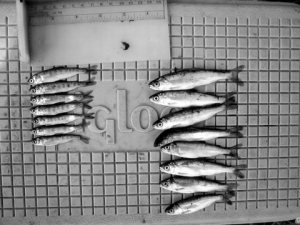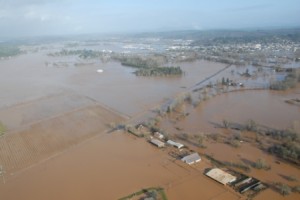We have much more to do and your continued support is needed now more than ever.
Puget Sound’s Vanishing Salmon
Haley Harguth is an intern at the National Wildlife Federation Pacific Regional Center in Seattle. She joined the team in 2010 and assists regional environmental policy projects. A native of the Pacific Northwest, she tries to get her regular fix of outdoor adventures in, while pursuing her MPA at the Evans School of Public Affairs at the University of Washington.
A Natural Legacy
In the Pacific Northwest, we are blessed with the kinds of surroundings that most people just read about in the glossy pages of magazines. Accordingly, we want to build homes and businesses as close to that natural beauty as we can get – often, in floodplains. Unfortunately, in doing so, we destroy the natural systems that sustain this essential ecosystem.
Floodplains are Critical Salmon Habitat
Salmon have forever been our pride in the Puget Sound Region. It’s for good reason, they are a keystone species that keeps this ecosystem living and breathing. Unfortunately, their unique fresh and saltwater lifestyle makes them very susceptible to the alterations that we have made to the vulnerable riparian areas on which they depend.

Development adds impervious surfaces which carry storm water runoff full of pollutants straight into nearby rivers. All of these factors have resulted in the dramatic decline of Puget Sound salmon populations.
These impacts also have a negative impact on other marine life. According to one study, orcas, who feed on the fish and contain 400-550 times higher concentration of toxic PCBs than humans, are leaving the Sound for cleaner waters up north, where food is more abundant.
The State of Washington’s Floodplains
The National Marine Fisheries Services cited these sobering facts in a recent evaluation of floodplain habitat impacts on Puget Sound salmon populations:
- 71 percent of the State’s floodplains are in poor condition.
- More than 90 percent of the wetlands and floodplains once associated with lowland alluvial rivers of the Puget Sound basin have been lost.
- Ditching, diking, and dredging activities in floodplains, primarily found in urban and agricultural regions, were associated with a 73 percent loss of coho salmon rearing habitat in the Skagit River system.
The Impact of the National Flood Insurance Program on Salmon
Since the National Flood Insurance Program (NFIP) began, it has served to make building in floodplains more affordable; with the assurance that those properties will be repaired if they flood. Our decisions about where to build homes and businesses typically come down to economics, not concern over fish. We don’t intend to harm salmon. We just want to be close to nature, and don’t want our homes to flood. But instead of factoring in the risk and costs of flooding, and the value of nature (and the fish), the NFIP alters our decisions based on false assurances, not accurate economics.

Support NWF’s efforts to defend Puget Sound floodplains, and learn more about similar efforts around the United States.





















